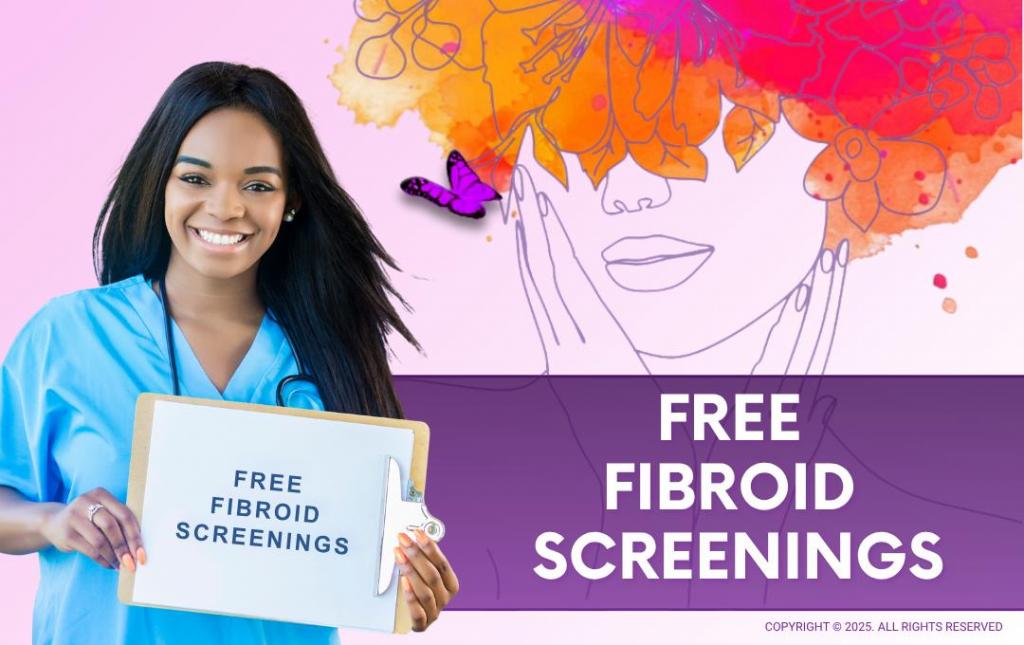
Unlock a healthier future. July is Fibroid Awareness Month, which spotlights uterine fibroids, a condition affecting millions of women worldwide. Many women live with painful and disruptive fibroid symptoms without realizing how common they are or that highly effective, minimally invasive treatments are available. Up to 80% of all women may develop fibroids by age 50, making awareness and early understanding key to better health outcomes. USA Fibroid Centers is dedicated to empowering women with comprehensive knowledge and access to early diagnosis and effective, non-surgical treatment options.

To help you make an informed decision about your health, USA Fibroid Centers is offering FREE fibroid screenings from July 1 to July 31. These quick and easy screenings can help identify fibroids at an early stage, paving the way for personalized treatment plans.
Call To Reserve a Free Screening
Understanding Uterine Fibroids: The Basics
Uterine fibroids, also known as leiomyomas, are common, benign (non-cancerous) growths that develop in the uterus. They vary greatly in size, quantity, and location, which is why symptoms can differ significantly from person to person. While benign, fibroids can cause a range of uncomfortable and disruptive symptoms, including:
- Heavy, prolonged menstrual bleeding
- Abdominal bloating or pressure
- Pelvic pain
- Frequent urination
- Pain during intercourse
- Constipation
These symptoms can significantly impact a woman’s quality of life and, in some cases, lead to unnecessary hysterectomies. In fact, approximately 60% of hysterectomy patients aren’t aware of non-surgical alternatives.
Are You at Risk?
While the exact cause of fibroids isn’t fully understood, several factors can increase your risk:
- Age: Most common in women in their 40s and 50s.
- High BMI (Body Mass Index)
- High Blood Pressure
- Family History: A strong family history of fibroids.
- No Previous Pregnancy
- Vitamin D Deficiency
If you’re experiencing symptoms or believe you might be at risk, it’s important to talk to a healthcare professional. You can also take our quick symptom quiz to better understand your potential symptoms.
Empowering You with Knowledge and Resources
Beyond identifying symptoms, Fibroid Awareness Month is about arming yourself with information. Our comprehensive resource library offers valuable insights into every aspect of fibroids.
Here’s How You Can Participate:
- Understanding Fibroids: Gain in-depth knowledge about the causes, symptoms, and types of fibroids.
- Symptom Management: Learn how to recognize and effectively manage common fibroid symptoms.
- Treatment Options: Explore a range of treatment options, from minimally invasive procedures to natural symptom management strategies.
- Fertility and Fibroids: Receive information and support regarding the potential impact of fibroids on fertility.
- Inspiring Patient Stories: Connect with courageous women sharing their journeys and advocating for fibroid awareness.
USA Fibroid Centers: Your Non-Surgical Solution
At USA Fibroid Centers, we specialize in Uterine Fibroid Embolization (UFE), a highly effective, non-surgical treatment for fibroids. UFE offers significant advantages over traditional surgery:
- Outpatient Procedure: Go home the same day to recover.
- Fertility Preservation: A vital benefit for women wishing to conceive.
- Minimal Risk: Lower risk of infection and complications compared to surgery.
- No General Anesthesia: A simpler, safer anesthetic approach.
- Faster Recovery: Most patients return to daily activities in one to two weeks, much quicker than surgical recovery.
Take Charge of Your Health This July
- Schedule Your Free Screening: Take advantage of this opportunity for early detection and peace of mind. Call our website to find a location near you and schedule your screening.
- Explore Our Resources: Visit our website for a wealth of informative articles and guides.
- Spread Awareness: Share this information with your network and empower others.
- Follow Us on Social Media: Stay connected for updates, expert insights, and upcoming events. (Link to social media pages)
Most major insurance programs cover UFE. Still have questions, please call our care team at 855.615.2555 to discuss your symptoms and treatment options.



